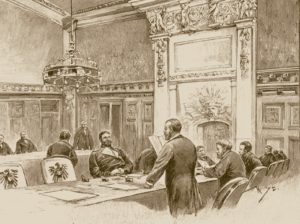National Federalism – The German Federation
 Victim of the nineteenth century’s obsession with sovereign States, German federal thought came to reject the idea of a divided or dual sovereignty. Sovereignty was indivisible, and the ‘new’ federalism was thus thought of in terms of a sovereign State. The ‘Federal State’ was seen as the ‘new world’ that de Tocqueville had been searching for. This subproject looks in detail at the genesis and evolution of the idea of the “Federal State” in the German constitutional context. It begins with an analysis of the 1871 Imperial Constitution, moves to the 1919 Weimar Constitution, and finally looks at the federal philosophy behind the 1949 Bonn Constitution.
Victim of the nineteenth century’s obsession with sovereign States, German federal thought came to reject the idea of a divided or dual sovereignty. Sovereignty was indivisible, and the ‘new’ federalism was thus thought of in terms of a sovereign State. The ‘Federal State’ was seen as the ‘new world’ that de Tocqueville had been searching for. This subproject looks in detail at the genesis and evolution of the idea of the “Federal State” in the German constitutional context. It begins with an analysis of the 1871 Imperial Constitution, moves to the 1919 Weimar Constitution, and finally looks at the federal philosophy behind the 1949 Bonn Constitution.
Each constitution will be explored alongside three dimensions. First, what were or are the political and constitutional safeguards of federalism in the three constitutional periods of German federalism? Where or are there constitutional conflicts in which distinct visions of sovereignty come to the fore? What is the role of the “regional” States? What is striking about the German conception of federalism in the twentieth century in is its success in other European States – for example France.
(researched by Prof. Robert Schütze)